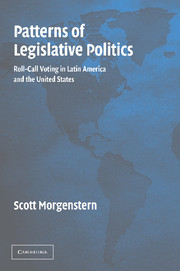Book contents
- Frontmatter
- Contents
- Tables and Figures
- Preface and Acknowledgments
- Party, Faction, and Coalition Names and Abbreviations
- 1 Patterns of Legislative Politics: Identifiability and Flexibility
- 2 Representation and the Agent System
- 3 Identifying Agents
- 4 Influences on Agent Unity: Discipline and Cohesion
- 5 Explaining Voting Unity
- 6 Policy Coalitions and Agent Flexibility
- 7 Conclusion
- Bibliography
- Subject Index
- Author Index
1 - Patterns of Legislative Politics: Identifiability and Flexibility
Published online by Cambridge University Press: 24 July 2009
- Frontmatter
- Contents
- Tables and Figures
- Preface and Acknowledgments
- Party, Faction, and Coalition Names and Abbreviations
- 1 Patterns of Legislative Politics: Identifiability and Flexibility
- 2 Representation and the Agent System
- 3 Identifying Agents
- 4 Influences on Agent Unity: Discipline and Cohesion
- 5 Explaining Voting Unity
- 6 Policy Coalitions and Agent Flexibility
- 7 Conclusion
- Bibliography
- Subject Index
- Author Index
Summary
Democracy is not to be found in the parties but between the parties.
(Schattschneider, 1942, p. 60)An effective party system requires, first, that the parties are able to bring forth programs to which they commit themselves and, second, that the parties possess sufficient internal cohesion to carry out these programs. In such a system, the party program becomes the work program of the party, so recognized by the party leaders in and out of the government, by the party body as a whole, and by the public.
(American Political Science Association, Committee on Political Parties, 1950, p. 18)Immoderate and ideological politics is conducive to sheer paralysis or to a disorderly sequence of ill-calculated reforms that end in failure.
(Sartori, 1976, p. 140)Shackled with dominant presidents and frequent interruptions by military governments, the legislatures have been generally overshadowed in discussions of Latin American politics. These institutions, however, are the cornerstones of democracy. When open, they provide arenas for debates, representation of societal interests, oversight of governmental processes, a source from which to recruit political leadership, a place in which to form political coalitions, as well as a legal institution in which the represented interests can debate and reach decisions on policy directions. Theoretically they, along with the executive, also provide citizens a target at which to address their wrath if government direction or performance run askance.
- Type
- Chapter
- Information
- Patterns of Legislative PoliticsRoll-Call Voting in Latin America and the United States, pp. 1 - 25Publisher: Cambridge University PressPrint publication year: 2003



